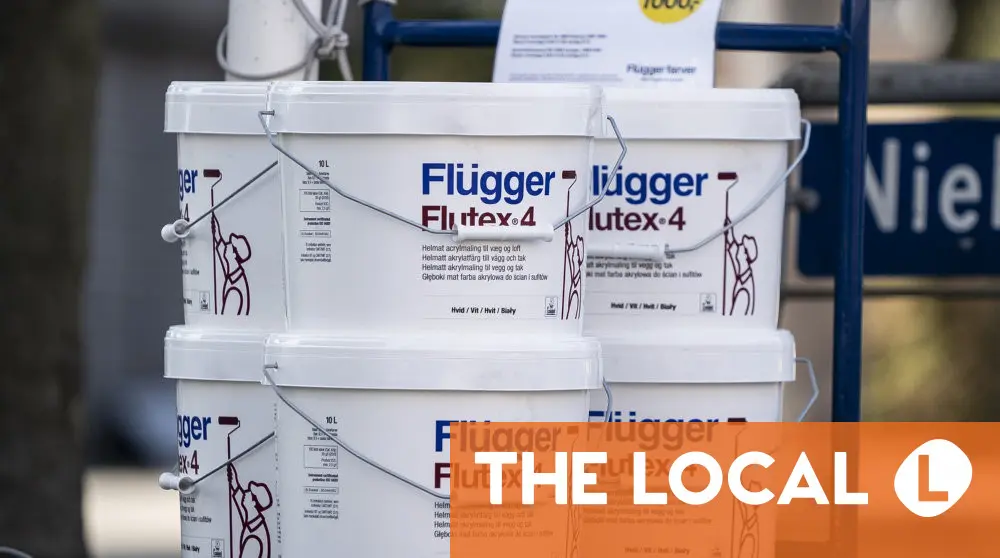From arrests at a Danish paint maker to the growing success of Copenhagen’s immigration policy at the EU, our weekly feature Inside Denmark looks at some of the stories we’ve been talking about this week.
Why a Danish paint maker is denying involvement in suspected Russia sanctions violation
Flügger, a billion-kroner Danish company known for its painting and decorating products, has been raided by the special police unit NSK due to suspicions it has violated EU sanctions against Russia, according to a report by broadcaster DR.
NSK has confirmed to DR that it carried out a raid in Copenhagen related to “a Danish company’s possible avoidance of sanctions against Russia” but declined to confirm Flügger was the subject of the operation.
Two individuals were arrested and later released, DR writes. Flügger has meanwhile confirmed to the Danish stock exchange that it is being investigated.
Earlier yesterday, DR published a report that Flügger products were still on sale across Russia despite being encompassed by the sanctions.
“We have left Russia, and our policy is absolutely clear that we do not want anything to do with that market. This has also been clearly communicated to our partners,” CEO Sune Schnack said in the statement to the stock exchange.
“Yet someone has apparently chosen to go behind our backs and resell paint in breach of the rules. That is completely unacceptable, and we are doing everything we can to put a stop to it,” he added.
A Russian businessman who was reportedly Flügger’s distributor in the country until 2022 may be implicated in the case according to DR’s reporting.
Advertisement
The businessman, Alexei Popov, told DR he represented Flügger in Russia until being sacked the year Russia invaded Ukraine and the majority of Western businesses abandoned the Russian market.
“Our selection is broad and includes more than 60 different items, which are shipped here,” Popov told DR in an interview in May 2023.
According to Flügger, however, he acted entirely on his own and misled the Danish company.
The company said in a statement to DR that it suspects resale to Russia via one or more distributors, possibly in Kazakhstan, Estonia, Azerbaijan, or Kyrgyzstan. It has therefore cancelled contracts with the distributors in question.
In a second report on Friday, DR writes about a dramatic recent increase in paint sales to Kazakhstan, with Danish exports of paint to the central Asian country going from 0 kroner in 2023 to 23.8 million kroner last year according to Statistics Denmark.
The broadcaster has also dug up social media footage of Schnack and Popov, apparently together at a Flügger promotional event in Kazakhstan.
“I think this resembles a pattern we’ve seen time and again when it comes to sanctions against Russia, as well as sanctions against other countries around the world,” Jakob Tolstrup, associate professor at the Department of Political Science at Aarhus University and a specialist in Russia and other former Soviet states, said to DR.
Tolstrup’s comments referenced earlier reports that exports to Russia’s neighbouring countries have scaled up significantly since sanctions were imposed.
Professor of criminal law Nicolaj Sivan Holst from Aarhus University also noted the role of the Russian businessman but told DR it’s not possible to state “with absolute certainty” that the paint exported to Kazakhstan ends up in Russia.
“There’s an overlap of individuals, and it does raise questions about how paint can still be bought in Russia, and why there’s suddenly such a strong demand for Flügger products in Kazakhstan. It seems a bit odd,” Holst said.
Flügger has declined an interview with DR, instead issuing the written statement in which CEO Sune Schnack said the company had been “misled”.
Advertisement
Denmark’s pushback on migration to EU gets reinforcement in time for EU presidency
Denmark’s strict migration policies have slowly spread across Europe, putting the country in a strong position to push for harsher EU-wide regulations during its upcoming EU presidency.
This is likely to include efforts to tighten rules on asylum and legal appeals.
Migration policy “is linked to security, that is to say that we need a Europe that is safer, more stable and robust, and that isn’t really the case if we don’t control the flows to Europe,” Danish European Affairs Minister Marie Bjerre said this week as she presented the country’s priorities for its EU presidency, which it takes over from Poland on July 1st.
Prime Minister Mette Frederiksen hopes to build EU consensus on externalising asylum procedures outside Europe, and restricting the scope of rulings from the European Court of Human Rights.
During a recent visit to Berlin, Frederiksen said the EU needs “new solutions to reduce the influx to Europe and to effectively send back those who don’t have the right to stay in our countries.”
The comments were made at a press conference with German Chancellor Friedrich Merz, who applauded the Danish “model”.
Advertisement
Merz showed he meant that praise this week when he took part in a meeting of EU immigration hawks in Brussels.
This was marked the first time a German leader has attended the gathering, which has become a stable fixture on the sidelines of EU summits of the bloc’s leaders over the past year and of which Denmark is a leading participant along with Italy and The Netherlands.
Thursday’s talks were attended by more than a dozen of the EU’s 27 leaders as well as European Commission chief Ursula von der Leyen, and Germany’s involvement adds plenty of weight.
The long-term goal of the Danish Social Democratic party has been to set up offshore asylum processing facilities. At first, Frederiksen’s government attempted to do this on its own before pivoting to working towards the aim within the EU, gaining backing of other countries.
What once looked like a long shot in a long list of strict Social Democratic immigration policies now seems a lot more likely to happen.
